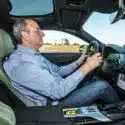Andrew Frankel: Battery power spells end of fun small cars
“Porsche’s decision to return to Le Mans was spurred on by Audi’s plan to do the same”
It has not been a great month for fans of electric racing cars. First Volkswagen shut its motor sport department, killing its extraordinary Pikes Peak-busting, Goodwood Hill record-smashing ID R in the process. Then Audi withdrew from Formula E, followed with undignified haste two days later by BMW.
The real worry lay within the latter’s cited reason for leaving. It stated ominously that it had ‘essentially exhausted the opportunities for this form of technology transfer’. Being a cynical cove, I naturally presumed they were all at it just to put their most environmentally saintly foot forward in front of a captive audience of willing converts upon whom they could then foist their existing and forthcoming battery electric cars. But if there were legitimate engineering reasons for participation and those reasons are now ‘exhausted’, it doesn’t bode particularly well for the future of the formula.
Formula E will weather this storm for now because there are still enough manufacturers involved, including Mercedes-Benz, Porsche, Nissan and Jaguar. But it is not looking quite as future proof as it once was.
Porsche’s decision to return to Le Mans was undoubtedly spurred on by in-house rival Audi’s decision to return to this new top-level sports car racing. Remember that Porsche followed Audi into LMP1 in 2014, and then into Formula E in 2019 (Porsche will remain in the electric series). But with Porsche, Audi, Peugeot and Toyota all (in some form or another) lining up for Le Mans in the coming years, who cares about Stuttgart’s motive?
Electric cars have been queuing up here of late, just one of which, the Volkswagen ID.3 is reviewed elsewhere on these pages. I’m not going to be able to cover them all partly because there’s not the space, but also because I’ve not yet found any of them sufficiently interesting to drive. And in addition to the VW, that includes the Honda e, the new Fiat 500, the Citroën C4 and Audi e-tron Sportback.
I know these cars represent at least the medium-term future (though I believe that ultimately hydrogen-powered cars will prevail) and there’s no question that they’re getting better. The Honda looks terrific and has a clever interior, the Fiat is the best-built car wearing that badge I’ve driven, the Citroën is quirky, and the Audi quiet and comfortable. But are any of them fun to drive? Not remotely. They’re all heavy, they all sound dull and all have lifeless steering. Indeed, I get the sense that the mountains that need climbing before such cars can be actively entertaining are so high, their manufacturers haven’t bothered trying. Instead they accept that those of us who want to enjoy the experience of driving will simply continue to buy cars fitted with internal combustion engines until we are no longer allowed. And then? Well, then we won’t have a choice.
“Generations will grow up not knowing how much fun small cars can be”
The pity is that, Audi aside, these are all small or compact cars which in the past and present have always provided the richest seam of affordable fun. But no longer the future, it seems. Who hasn’t enjoyed bombing about the place in anything from an original Mini to a modern Ford Fiesta? Because these cars are inherently light and simple, all it’s taken in the past is a chassis engineering team with a sense of humour to make them fun to drive. No longer.
And although I accept the world has to change and we must change with it, I cannot think it anything less than a shame that without some kind of technological breakthrough that will somehow allow electric cars to become light and simple too, the time will soon come when entire generations will grow up never knowing how much fun small cars can be.
Every time I drive something expensive, exotic and mainly intended for track use, I can guarantee someone will pop up and sniff, “You could pay a tenth of that money and go just as fast in a Radical.” While I’ve always explained that going fast is not the only reason people buy such cars, I’ve always had a nagging doubt that they are at least in part correct.
This was not helped when a couple of weeks back I drove a Radical for the first time in five years. Two of them in fact. The one I was invited to drive was the new SR10, which is intended to pack the punch of its famed SR8 stablemate but without the maintenance costs of the latter’s manic 2.7-litre V8 motor. Instead it uses a turbocharged 2.3-litre Ford Focus ST engine tuned to give 425bhp. In a car weighing just 725kg this provides a power-to-weight ratio comparable to the McLaren Senna.
Then, as a kind of cherry on the cake, they kindly bolted me into the new SR3 XX, which is the latest evolution in the standard SR3 that has been Radical’s core offering for the last 20 years. It only has 226bhp from a 1500cc Suzuki motorcycle engine, but costs £70,000 new instead of more than £100,000 for the SR10. Weighing just 620kg, it is one of the best little racing cars I’ve had the pleasure to drive. Everything – the mechanical grip, power, brakes – seems perfectly matched.
As someone who races historics, it often takes me time to dial into slicks and wings racers, but not this Radical. I was comfortable on the first lap, hooting with laughter the next, seeing how far I could push it the one after that. Radical claims the SR3 is the world’s best-selling racing car. After that experience, I can see why.
A former editor of Motor Sport, Andrew splits his time between testing the latest road cars and racing (mostly) historic machinery
Follow Andrew on Twitter @Andrew_Frankel

